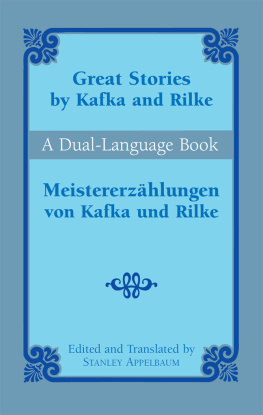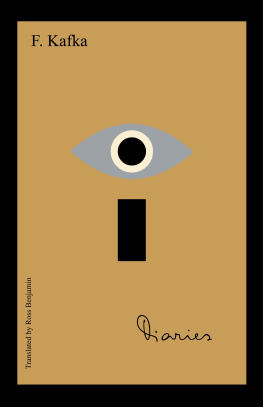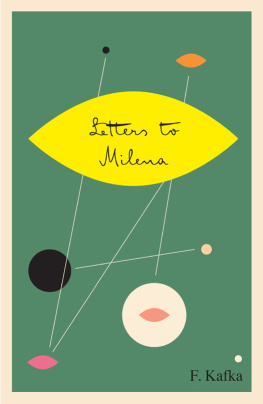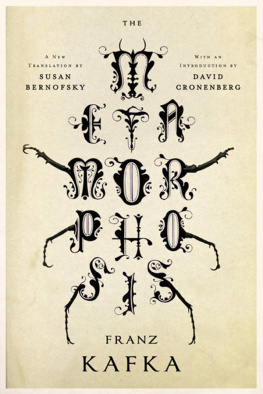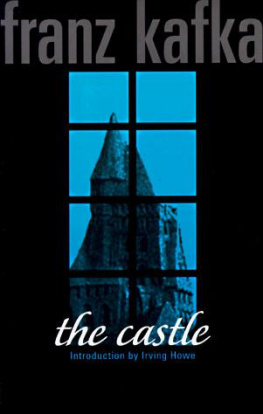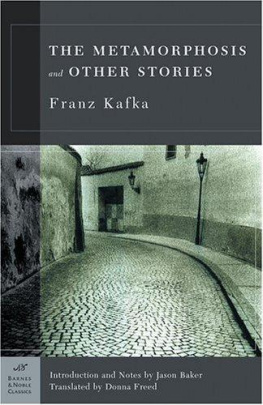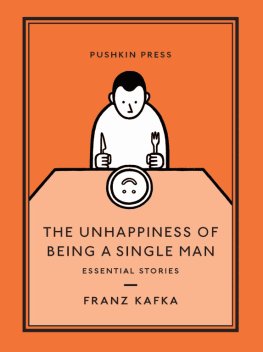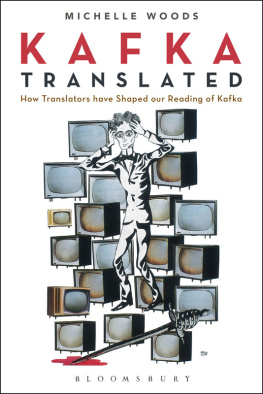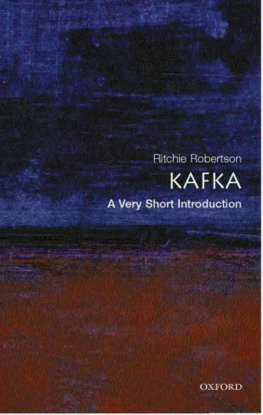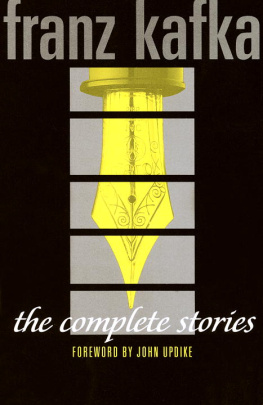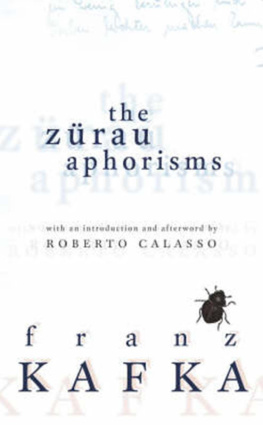PENGUIN BOOKS
The Great Wall of China and Other Short Works
Franz Kafka was born of Jewish parents in Prague in 1883. The family spoke both Czech and German; Franz was sent to German-language schools and to the German University, from which he received his doctorate in law in 1906. He then worked for most of his life as a respected official of a state insurance company (first under the Austro-Hungarian Empire, then under the new Republic of Czechoslovakia). Literature, of which he said that he consisted, had to be pursued on the side. His emotional life was dominated by his relationships with his father, a man of overbearing character, and with a series of women: Felice Bauer from Berlin, to whom he was twice engaged; his Czech translator, Milena Jesensk-Pollak, to whom he became attached in 1920; and Dora Diamant, a young Jewish woman from Poland in whom he found a devoted companion during the last year of his life. Meanwhile, his writing had taken a new turn in 1917 with the outbreak of the tubercular illness from which he was to die in 1924. Only a small number of Kafkas stories were published during his lifetime, and these are published in Penguin as Metamorphosis and Other Stories. He asked his friend, Max Brod, to see that all the writings he left should be destroyed. Brod felt unable to comply and undertook their publication instead, beginning with the three unfinished novels, The Trial (1925), The Castle (1926) and Amerika (1927). Other shorter works appeared posthumously in a more sporadic fashion, and a representative selection of them is collected in this volume.
Malcolm Pasley was born in 1926 and was educated at Sherborne School and Trinity College, Oxford. He is an Emeritus Fellow of Magdalen College, Oxford, a Fellow of the British Academy and a member of the German Academy for Language and Literature. As one of the editors of the Critical Kafka Edition, he was responsible for The Castle (1982), The Trial (1990) and Posthumous Writings and Fragments: Volume I (1993). His recent publications on Kafka include a collection of essays, The script is unalterable (1995).
FRANZ KAFKA

THE GREAT WALL OF CHINA
AND OTHER SHORT WORKS
TRANSLATED FROM THE GERMAN AND EDITED BY
MALCOLM PASLEY

PENGUIN BOOKS
PENGUIN BOOKS
Published by the Penguin Group
Penguin Books Ltd, 80 Strand, London WC2R 0RL, England
Penguin Putnam Inc., 375 Hudson Street, New York, New York 10014, USA
Penguin Books Australia Ltd, 250 Camberwell Road, Camberwell, Victoria 3124, Australia
Penguin Books Canada Ltd, 10 Alcorn Avenue, Toronto, Ontario, Canada M4V 3B2
Penguin Books India (P) Ltd, 11 Community Centre, Panchsheel Park, New Delhi 110 017, India
Penguin Books (NZ) Ltd, Cnr Rosedale and Airborne Roads, Albany, Auckland, New Zealand
Penguin Books (South Africa) (Pty) Ltd, 24 Sturdee Avenue, Rosebank 2196, South Africa
Penguin Books Ltd, Registered Offices: 80 Strand, London WC2R 0RL, England
www.penguin.com
This translation first published under the title
Shorter Works, Volume I, by Martin Secker & Warburg 1973
Published in Penguin Books 1991
Reprinted in Penguin Classics 2002
5
Translation copyright Malcolm Pasley, 1973
All rights reserved
Except in the United States of America, this book is sold subject
to the condition that it shall not, by way of trade or otherwise, be lent,
re-sold, hired out, or otherwise circulated without the publishers
prior consent in any form of binding or cover other than that in
which it is published and without a similar condition including this
condition being imposed on the subsequent purchaser
CONTENTS

EDITORS PREFACE

THE present volume contains the major short works left by Kafka, and it presents them for the first time in the order of their composition. The sequence and dating of the works is particularly important, because of the very close links between his life and his writing. So it may be useful to mention here some of the relevant biographical facts, although of course these cannot by themselves supply an interpretation of the stories. Kafkas work is full of autobiographical material, but equally it is more than just a kind of veiled autobiography. He did indeed say that some of his pieces were really no more than jottings or doodlings of an entirely private nature, but his chief aim in turning his life into literature was to go beyond the merely personal, to bring out the fundamental mythical patterns of human existence, and so to raise the world into the pure, the true, the immutable (diary of 25 September 1917).
Franz Kafka was born in 1883 of Bohemian-Jewish parents, and spent most of his life in Prague, that city of mixed tongues and national conflict, dominated by a magnificent castle that no longer contained a king. His experience of Prague always enters into the depiction of cities in his works, whether it is the accursed city of Babylon to which he lends the Prague coat of arms with its clenched fist (The City Coat of Arms) or the Imperial City of Peking (The Great Wall of China). In Prague he was well acquainted with the business world his father ran a wholesale firm dealing in fashion accessories in the Old Town Square and with the administrative and legal world also: after studying law at the Charles University he served from 1908 to 1922 in the Workers Accident Insurance Office for the Kingdom of Bohemia, as a conscientious and respected official of what he privately called a dark nest of bureaucrats. The operations of commerce, law, and public administration find their way into many of his stories, either as real background (My Neighbour, The Married Couple) or as a kind of metaphorical framework (The Refusal, The Problem of Our Laws, Advocates), and the semi-ironical use of legal and official jargon becomes an integral part of his literary style. Most important of all, Prague was the city where Western European Jewish intellectuals, like Kafka and almost all his friends, had become most painfully aware of their own rootlessness. Largely emancipated from the faith of their fathers, they were for the most part incompletely and unhappily assimilated to the German culture which held sway over a Slav population. In these circumstances many of them, such as Kafkas friend and literary champion Max Brod, become ardent Zionists. The idea of a return home to Palestine came to attract Kafka as well in his later years, but this solution always seemed to him rather too particular, and in any case a little too good to be true, like a fairy tale. He first became really aware of his own Jewishness when he got to know a group of Yiddish actors from Poland who were visiting Prague in 1911 (this decisive experience is echoed in the episode of the seven dog musicians in Investigations of a Dog, which of all the stories in this volume comes closest to autobiography); he became conscious of the mysterious power that still seemed to reside in the genuine Jewish communities of Eastern Europe. It appears from his diaries and letters that he found relatively primitive and superstitious communities at once sympathetic, comic, and strangely awe-inspiring, as if for all their limitations they were in possession of a secret from which he was excluded; this applied also to the village communities of the Czech provinces, whose contrast to the intellectual Babel of Prague struck him so forcibly on his journeys from the city (cf. The Village Schoolmaster).
Next page

